Unit2 Topic2知识点讲解和练习
初二上 Unit2 topic 2 知识点
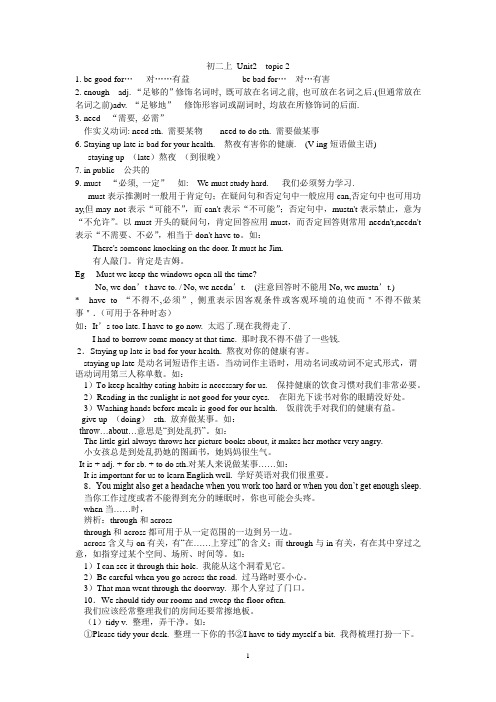
初二上Unit2 topic 21. be good for…对……有益be bad for…对…有害2. enough adj. “足够的”修饰名词时, 既可放在名词之前, 也可放在名词之后.(但通常放在名词之前)adv. “足够地”修饰形容词或副词时, 均放在所修饰词的后面.3. need “需要, 必需”作实义动词: need sth. 需要某物need to do sth. 需要做某事6. Staying up late is bad for your health. 熬夜有害你的健康. (V-ing短语做主语)staying up (late)熬夜(到很晚)7. in public 公共的9. must “必须, 一定”如: We must study hard. 我们必须努力学习.must表示推测时一般用于肯定句;在疑问句和否定句中一般应用can,否定句中也可用功ay,但may not表示“可能不”,而can't表示“不可能”;否定句中,mustn't表示禁止,意为“不允许”。
以must开头的疑问句,肯定回答应用must,而否定回答则常用needn't,needn't 表示“不需要、不必”,相当于don't have to。
如:There's someone knocking on the door. It must he Jim.有人敲门。
肯定是吉姆。
Eg -Must we keep the windows open all the time?-No, we don’t have to. / No, we needn’t. (注意回答时不能用No, we mustn’t.)* have to “不得不,必须”, 侧重表示因客观条件或客观环境的迫使而"不得不做某事".(可用于各种时态)如:It’s too late. I have to go now. 太迟了.现在我得走了.I had to borrow some money at that time. 那时我不得不借了一些钱.2.Staying up late is bad for your health. 熬夜对你的健康有害。
仁爱版七年级英语上册Unit2 Topic2 _课文重难点讲解

Unit2 Topic2 课文重难点讲解【1】—We don’t look the same, but we’re good friends, too!我们看起来不一样,但我们也是好朋友。
look the same意为“看起来一样”,其中look是动词,意为“看起来……”。
其反义词组是l ook different。
【2】Oh, I see. I’ll give it to her.哦,我知道了,我会把它给她。
give sth. to sb.或give sb. sth. 意为“把某物给某人”。
因此,此句也可改为:Please give Maria this letter.但是当用代词it (它),them (他们)代替某物时,只能用于give it/them to sb.结构中。
如:Please give them to him.请把它们给他。
【3】What d oes she look like? 她看上去是什么样子的?(1) What d o/does sb. l ook like? 意为“某人看上去是什么样?”该句常用来表示对某人相貌、身材等的提问。
如:—What does your sister look like?你姐姐看起来什么样?—She is thin and tall.她又瘦又髙。
—What do your parents look like?你的父母看起来什么样?—My mother is short but my father is tall.我的妈妈矮,但是我爸爸高。
(2) look like…意为“看上去像……”,like为介词,意为“像……一样”。
如:Mary looks like her mother. 玛丽看起来像她的妈妈。
The girl is tall like you. 这个女孩像你一样高。
【4】She is tall and she has short brown hair. 她高个子,留着棕色的短发。
Unit 2 Topic 2知识梳理仁爱版英语八年级上册
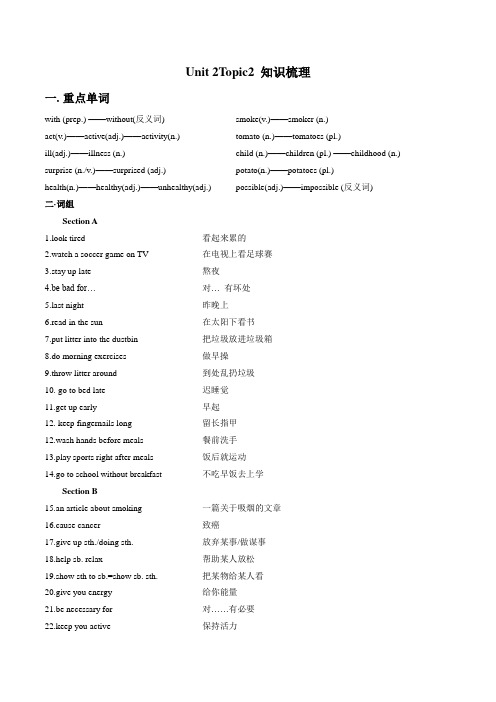
Unit 2Topic2 知识梳理一.重点单词with (prep.) ——without(反义词) smoke(v.)——smoker (n.)act(v.)——active(adj.)——activity(n.) tomato (n.)——tomatoes (pl.)ill(adj.)——illness (n.) child (n.)——children (pl.) ——childhood (n.) surprise (n./v.)——surprised (adj.) potato(n.)——potatoes (pl.)health(n.)——healthy(adj.)——unhealthy(adj.) possible(adj.)——impossible (反义词) 二·词组Section A1.look tired 看起来累的2.watch a soccer game on TV 在电视上看足球赛3.stay up late 熬夜4.be bad for… 对… 有坏处st night 昨晚上6.read in the sun 在太阳下看书7.put litter into the dustbin 把垃圾放进垃圾箱8.do morning exercises 做早操9.throw litter around 到处乱扔垃圾10. go to bed late 迟睡觉11.get up early 早起12. keep fingernails long 留长指甲12.wash hands before meals 餐前洗手13.play sports right after meals 饭后就运动14.go to school without breakfast 不吃早饭去上学Section B15.an article about smoking 一篇关于吸烟的文章16.cause cancer 致癌17.give up sth./doing sth. 放弃某事/做谋事18.help sb. relax 帮助某人放松19.show sth to sb.=show sb. sth. 把某物给某人看20.give you energy 给你能量21.be necessary for 对……有必要22.keep you active 保持活力23.take a walk 散步Section C24.be careful (not) to do sth… 小心(不)要做做谋事25.cause illness/diseases 引发疾病26.take care of sb. well= take good care of sb.照顾好某人27.force sb. to do sth. 强迫某人做谋事28.during one’s childhood 在某人童年时期29.make sb. do sth. 使某人做谋事30.get mad 生气31.be surprised to do sth. 做谋事感到很吃惊32.as soon as… 一…就…33.during his childhood 在他的童年期间34.by chance 偶然地Section D35.as soon as possible 尽快36.not only… but (also)… 不仅…而且…37.tell sb. (not) to do sth. 告诉某人(不)要做谋事38.in fact 实际上,事实上三.重点句子1. I’m sorry to hear that. 听到这个我感到很抱歉。
仁爱版英语九年级Unit-2-Topic-2知识点

Unit 2 Topic 2(Grade Nine)Ⅰ、词组及用法1、blow strongly 风猛吹rain heavily 下大雨2、blow away 吹走3、wash away 冲走4、cut down 砍伐,缩短cut in 插嘴,打断(说话)cut off 切断(电源,水);中断cut out 剪下;删去cut up 切碎留意:动副构造,代词必需放中间,且用宾格。
eg. cut down the trees=cut the trees down cut it/them down 5、as a result 结果as a result of…由于…eg. As a result,he passed the exam.As a result of careless,she didn’t pass the exam.6、change/turn…,into…把…变成…7、stop/prevent/keep…from sth/doing sth 阻挡(做)某事eg. Trees can stop/prevent/keep the water from washing the earth away.8、save用法(1)贮存、保存eg. Forests can save a lot of water.Save sb sth=save sth for sb 为某人保存…(2)节约、节约,避开(金钱、时间等)奢侈eg. We should save time.(3)救,挽救eg. save one’s life 挽救某人的命He saved his friend’s life in the accident.9、in danger 处在危急中in danger of…处在…的危急中10、die out 灭亡eg. Some animals are in danger of dying out.11、come to …想到,意识到,总计,总共eg. The good idea comes to him in a flash.他灵机一动,计上心来.That comes to 23 yuan, madam.总共23元,夫人.12、the importance of……的重要性eg. Many people have come to understand/realize the importance of plantingtrees.13、sth says that…用“文字,数字”表达信息(主语,是事或物)eg. It says in the newspaper that pollution is still a serious problem.The newspaper says that pollution is still a serious problem.It’s said that…据说…It’s reported that…据报道…It’s well known that…众所周知…It’s believed that…人们信任…14、here and there=everywhere 到处15、worst of all 最糟糕的是16、in the beginning 指一件事的初期17、take away 拿走,取走,带走18、escape sth/doing stheg. He is very lazy. He often escapes the study.The man escaped doing the work.escape…from…从…逃脱eg. The boy escaped successfully from that big fire.19、refer to sth/sb 谈及/提到/涉及某人或某事20、seem用法(1)It seems that+从句eg. It seems that their living conditions are very good.(2)主语+seem to do stheg. She seems to pass the test.(3)主语+seem+形容词eg. He seems very happy.21、protect/destroy the environment 爱护/破坏环境22、avoid sth/doing sth 避开eg. Try to avoid speaking loudly in the reading.How can they avoid a serious water shortage?23、be short of…短缺…缺乏…24、divide…into…把…分成…25、come into being 形成Ⅱ、辨析1、a number of…与the number of…a number of…=many+名复…很多…a great/large/small number of…eg. A large number of books have been soldthe number of+名(复)+谓(单)……的数量eg. The number of the students in our school is 3900.2、none与no one△none of+名/代词+谓语…eg. None of the girls likes/like playing the violin.——How many birds can you see in the picture?——None.——How much milk is there in the bottle?——None.△no one 没有人,不与of连用,可与else连用,作主语时,谓语动词单数。
仁爱英语八年级上册Unit2-topic2知识点总结
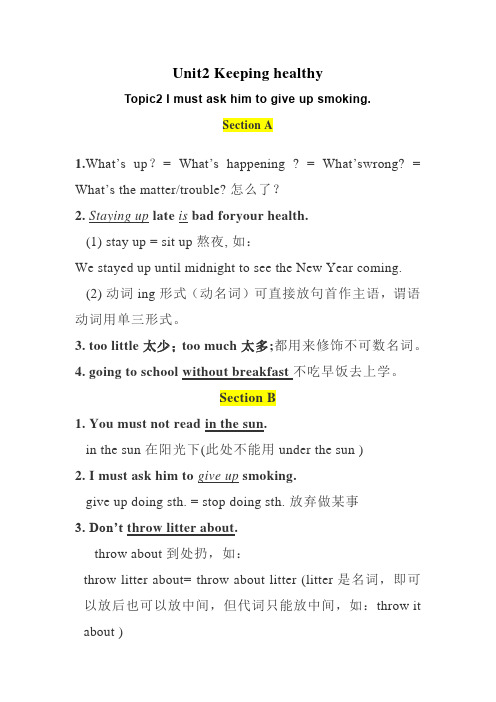
Unit2 Keeping healthyTopic2 I must ask him to give up smoking.Section A1.What’s up?= What’s happening ? = What’swrong? = What’s the matter/trouble? 怎么了?2. Staying up late is bad foryour health.(1) stay up = sit up熬夜, 如:We stayed up until midnight to see the New Year coming. (2) 动词ing形式(动名词)可直接放句首作主语,谓语动词用单三形式。
3. too little 太少; too much 太多;都用来修饰不可数名词。
4. going to school without breakfast 不吃早饭去上学。
Section B1. You must not read in the sun.in the sun 在阳光下(此处不能用under the sun )2. I must ask him to give up smoking.give up doing sth. = stop doing sth. 放弃做某事3. Don’t throw litter about.throw about 到处扔,如:throw litter about= throw about litter (litter是名词,即可以放后也可以放中间,但代词只能放中间,如:throw it about )4. go for a walk 去散步; take a walk = have a walk 散步5. It will keep you active during the day.(1)keep + 宾语+ 补语(补语可以是:动词ing 形式;形容词;介词短语)①I’m sorry to keep you waiting for sucha long time. (keep sb. doing sth.使某人一直做某事 )②Keep the door open, please. (keep sb/sth+形容词表示某人/某事物保持怎样的状态)③Once a cold keep the child in bed forthree days (keep sb+介词短语表示某人呆在某地)(2) during the day = in the daytime 在白天Section C1. It may show that something is wrongwith your health.(1) show sb. sth. = show sth. to sb. 向某人展示某物 please show me your new book.(2) show sb. around 某地表带某人参观某地:I’ll show you around our schooltomorrow.2. You can get a headache when you exercise onan empty stomach.on an empty stomach 空腹3. We can get into the human body throughthe nose.(1) get into 进入,陷入; 如:get into trouble 陷入麻烦(2)①through 从物体内部穿过,如:walk through a forest.②across 从物体表面横穿,如:go across the road③ over 从物体上空越过, 如:fly over the city4. The boy has an illness.illness = sickness疾病(名词),很少表示具体的疾病,只表示抽象的疾病,disease 常表某种疾病。
仁爱英语八年级上Unit2.topic2知识点归纳
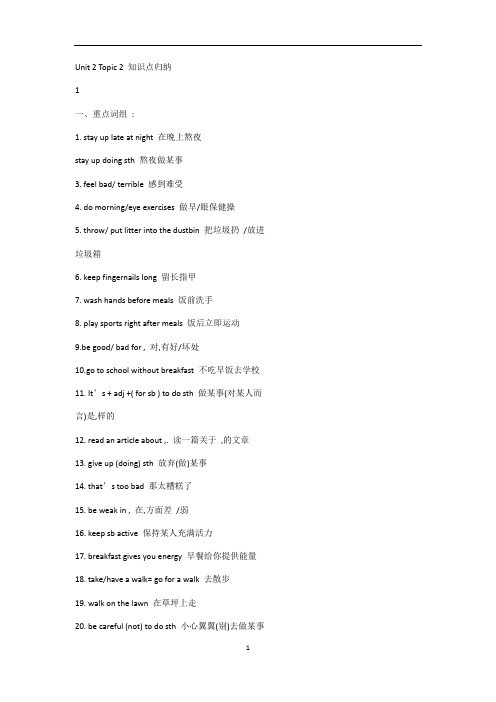
Unit 2 Topic 2 知识点归纳1一、重点词组:1. stay up late at night 在晚上熬夜stay up doing sth 熬夜做某事3. feel bad/ terrible 感到难受4. do morning/eye exercises 做早/眼保健操5. throw/ put litter into the dustbin 把垃圾扔/放进垃圾箱6. keep fingernails long 留长指甲7. wash hands before meals 饭前洗手8. play sports right after meals 饭后立即运动9.be good/ bad for , 对,有好/坏处10.go to school without breakfast 不吃早饭去学校11. It’s + adj +( for sb ) to do sth 做某事(对某人而言)是,样的12. read an article about ,. 读一篇关于,的文章13. give up (doing) sth 放弃(做)某事14. that’s too bad 那太糟糕了15. be weak in , 在,方面差/弱16. keep sb active 保持某人充满活力17. breakfast gives you energy 早餐给你提供能量18. take/have a walk= go for a walk 去散步19. walk on the lawn 在草坪上走20. be careful (not) to do sth 小心翼翼(别)去做某事21. force sb to do sth 强迫某人做某事22. as soon as 一,就, .23. during one’s childhood 在某人童年24. get mad 生气,变疯25. be always doing sth 总是做某事26. to one’s surprise 令某人吃惊的是be surprised to do sth 惊奇地做某事be surprised at sht 对某事感到惊讶e sth to do sth= use sth for doing sth利用, .做,.28. as,as possible= as, as one can 尽可能的, .as soon/much as possible 尽可能快/多29. drink sour milk 喝变质牛奶30.tidy one’s room 整理房间31. make one’s bed 整理床铺32. spit everywhere/in public 到处/在公共场合吐痰33. as we (all) know众所周知34. help sb relax 帮助某人放松35. in fact 事实上,实际上36. not only , but (also), 不仅,而且, .37.during the day= in the daytime 在白天38. make sb do sth 使某人做某事39. cause cancer 引发癌症40. in the newspaper 在报纸上二、必背重点句型1.Staying up late is bad for your health. 熬夜对你的健康有害. (动名词短语做主语,谓语动词用三人称单数)2.Is going to bed early good or bad for your health? It’s good.早点睡觉对你的健康有益还是有害? 有益. (选择问句要根据事实回答)3.It will keep you active in the daytime.它(早睡早起)将使你在白天保持旺盛的精力.4.You must not throw litter about.= Don’t throw litter about. 不要乱扔垃圾.5.The article says smoking is bad for our lungs. 文章上说吸烟对我们的肺有害6. I must ask him to give up smoking.我必须叫他戒烟。
仁爱版九年级unit2topic2知识点

仁爱版九年级unit2topic2知识点仁爱版九年级Unit 2 Topic 2 知识点在仁爱版九年级的英语教材中,Unit 2 Topic 2是一个关于社交交际的话题,主要介绍了一些有关交际礼仪和文化差异的知识。
通过学习这个话题,我们可以更好地理解不同国家和文化间的沟通方式和习俗,提高自己的跨文化交际能力。
首先,我们来了解一下在不同场合中的交际礼仪。
不同的国家和文化对待社交活动的方式可能有所不同。
例如,在中国,人们常常会相互敬酒,尊重长辈和上司。
而在西方国家,人们通常会握手问候,有时还会互相拥抱。
这些细微的差别体现了不同文化对于尊重和亲密度的不同理解。
除了语言之外,身体语言在交际过程中也起着重要的作用。
比如,微笑是一种普遍的友好表达方式,不论是在东方还是西方文化中都备受欢迎。
此外,眼神交流、姿势和手势等也包含着很多信息。
在不同的文化中,这些身体语言的使用方式和含义可能会有所不同。
因此,在跨文化交际中,我们需要学会观察并适应对方的身体语言,以避免产生误解。
另一个重要的主题是文化差异。
不同国家和地区有着各自独特的文化和传统。
通过学习这些差异,我们可以更好地理解和尊重其他国家和文化。
例如,在中国,给别人送礼物是一种常见的社交行为,表示尊重和友好。
而在某些西方国家,人们可能会认为送礼物过于热情,甚至会觉得被贿赂。
因此,在跨文化交际中,了解并尊重对方的文化习俗是非常重要的。
此外,语言的使用也会因文化差异而产生困难。
在某些情况下,即使使用相同的语言,由于文化背景的不同,也会产生误解。
例如,口头禅在不同文化中的使用方式和含义可能截然不同,甚至有争议。
为了避免这种情况的发生,我们需要更多地学习和了解其他文化的习俗和语言用法。
总结一下,仁爱版九年级的Unit 2 Topic 2 知识点主要包括交际礼仪和文化差异。
通过学习这个话题,我们可以提高自己的跨文化交际能力,更好地进行跨国交流。
在社交场合中,了解不同国家和文化的习俗和礼仪是非常重要的。
初中英语 仁爱版八年级上册Unit 2 Topic 2知识点
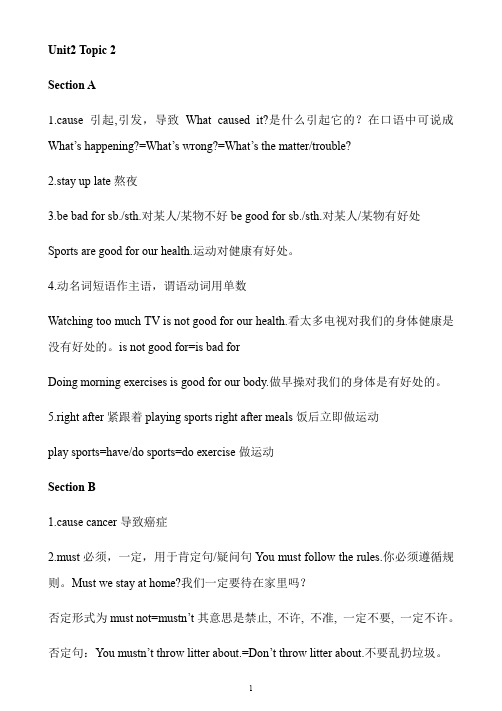
Unit2 Topic 2Section A1.cause引起,引发,导致What caused it?是什么引起它的?在口语中可说成What’s happening?=What’s wrong?=What’s the matter/trouble?2.stay up late熬夜3.be bad for sb./sth.对某人/某物不好be good for sb./sth.对某人/某物有好处Sports are good for our health.运动对健康有好处。
4.动名词短语作主语,谓语动词用单数Watching too much TV is not good for our health.看太多电视对我们的身体健康是没有好处的。
is not good for=is bad forDoing morning exercises is good for our body.做早操对我们的身体是有好处的。
5.right after紧跟着playing sports right after meals饭后立即做运动play sports=have/do sports=do exercise做运动Section B1.cause cancer导致癌症2.must必须,一定,用于肯定句/疑问句You must follow the rules.你必须遵循规则。
Must we stay at home?我们一定要待在家里吗?否定形式为must not=mustn’t其意思是禁止, 不许, 不准, 一定不要, 一定不许。
否定句:You mustn’t throw litter about.=Don’t throw litter about.不要乱扔垃圾。
由must(必须、一定要)开头的问句, 不用mustn’t 来回答,而应用needn’t 或don’t have to来回答。
Eg:Must he clean the room before class? 他一定要在课前打扫教室吗?肯定回答: Yes, he must. 是的, 一定要。
Unit2 Topic2仁爱版英语八年级上册课文同步翻译知识梳理和话题写作范文

仁爱版英语八年级上册Unit2 Topic2 课文同步翻译知识梳理和话题写作范文Unit 2 Topic 2同步翻译Section C 1a. Read and understand.妈妈们让吃的食物妈妈们经常告诉自己的孩子应该吃什么。
康康小时候,他妈妈经常跟他说,“不要吃太多盐或者糖。
”她说这可能会让人生病。
马丽亚的妈妈经常把马丽亚照顾的很周到。
例如,马丽亚的牙齿不好,所以她妈妈就不让她吃太多糖果或者冰激凌。
牛奶是健康的饮料。
简并不喜欢喝,可是她妈妈经常逼她喝。
她每天早上去上学前,都必须得喝一杯牛奶,因为她妈妈会监督她。
迈克尔小时候为了身体健康,必须得吃很多蔬菜和水果。
有一次,迈克尔的盘子里有卷心菜。
他一看到就生气了。
但是他妈妈强迫他尝了尝。
他很惊喜地发现卷心菜很好吃。
Unit 2 Topic 2知识梳理Topic2 I must ask him to give up smoking.【重点短语】1.stay up late 熬夜到很晚2.do morning exercises 做早操3.throw litter around 到处乱扔垃圾4.read in the sun 在太阳下读书5.in the newspaper在报纸上6.give up doing sth.7.show sth. to sb.=show sb. sth.8.It’s +adj.+ for sb. to do sth.对某人来说做某事……9.be careful not to do sth.小心不要做某事10.force sb. to do sth.迫使某人做某事11.leave for sp. 前往某地12.as soon as… 一……就……13.get/be mad 发疯14.be surprised to do sth. 惊奇于做某事15.in fact 事实上16.as soon as possible 尽可能快的【重点句型】1.Staying up late is bad for your health.熬夜到很晚对你的健康有害。
unit2 topic2 知识重点

Unit 2 Topic 2一、look 的用法看起来:look the same ,look like ,look different 例句:你们长得很像。
你们长得不像。
你长得像你的妈妈。
二、颜色的询问和回答:问单数:-What color is it? -It’s+颜色。
问复数:-What color are they? -They’re +颜色。
练习:1、它是什么颜色的?它是紫色的。
2、它们是什么颜色的?它们是金色的。
3、你的头发是什么颜色的?它是黑色的。
4、你的眼睛是什么颜色的?它们是蓝色的。
三、give的用法give sb(某人) sth(某物) = give sth(某物) to sb(某人)例句:给玛利亚这封信。
=把这封信给玛利亚。
给她那些书。
=把那些书给她。
注:四、主格和宾格的用法:谓语动词前用主格,谓语动词后用宾格。
简称“主动”“动宾”1. —____ don’t speak English well. Could you help ____ with it?—No problem. (they/them)2. —Excuse ____, are you from Beijing?—Yes, ____ am. (I/me)3. —Is Mr. Zhang your Chinese teacher?—Yes, ____ is. We like ____ very much. (he/him)4. —Who’s the woman?—Sorry. I don’t know ____. ____ is a new teacher. (she/her).5. —____ are your new classmates. Could you tell ____ your name?—Sure. (we/us)五、1)询问人的长相:问:What do/does +主语+ look like ? 答:sb have/has....例:你的老师长什么样子?What does your teacher look like ? She has long blond hair.2)多个形容词修饰名词口诀:县官行令赦国才=限观形龄色国才例句:这是一件用中国丝绸做的红色的可爱的小外套。
16年仁爱英语九年级上册_Unit_2_topic_2_重点知识点eva
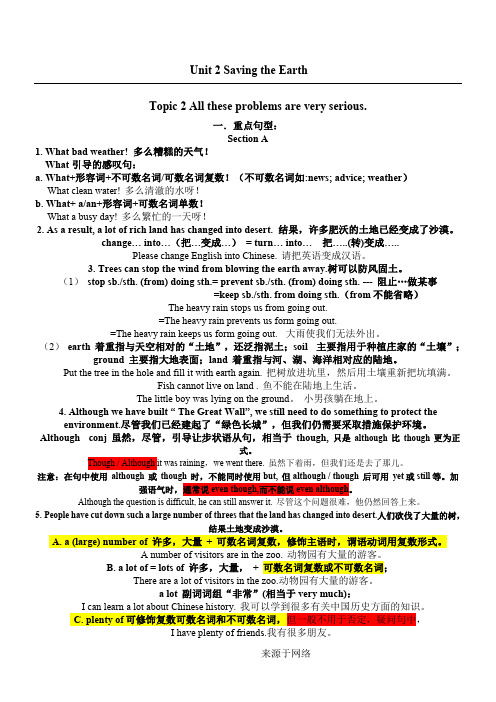
Unit 2 Saving the EarthTopic 2 All these problems are very serious.一.重点句型:Section A1. What bad weather! 多么糟糕的天气!What引导的感叹句:a.What+形容词+不可数名词/可数名词复数!(不可数名词如:news; advice; weather)What clean water! 多么清澈的水呀!b.What+ a/an+形容词+可数名词单数!What a busy day! 多么繁忙的一天呀!2. As a result, a lot of rich land has changed into desert. 结果,许多肥沃的土地已经变成了沙漠。
change… into…(把…变成…)= turn… into… 把…..(转)变成…..Please change English into Chinese. 请把英语变成汉语。
3. Trees can stop the wind from blowing the earth away.树可以防风固土。
(1)stop sb./sth. (from) doing sth.= prevent sb./sth. (from) doing sth. --- 阻止…做某事=keep sb./sth. from doing sth.(from不能省略)The heavy rain stops us from going out.=The heavy rain prevents us form going out.=The heavy rain keeps us form going out. 大雨使我们无法外出。
(2)earth 着重指与天空相对的“土地”,还泛指泥土;soil 主要指用于种植庄家的“土壤”;ground 主要指大地表面;land 着重指与河、湖、海洋相对应的陆地。
八年级上册英语u2t2知识点
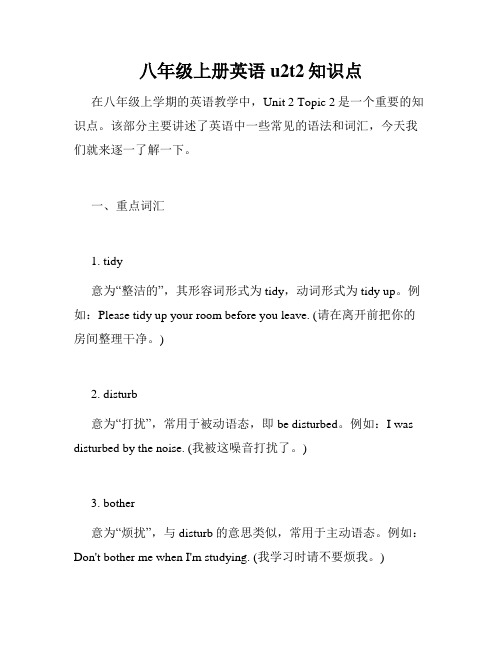
八年级上册英语u2t2知识点在八年级上学期的英语教学中,Unit 2 Topic 2是一个重要的知识点。
该部分主要讲述了英语中一些常见的语法和词汇,今天我们就来逐一了解一下。
一、重点词汇1. tidy意为“整洁的”,其形容词形式为tidy,动词形式为tidy up。
例如:Please tidy up your room before you leave. (请在离开前把你的房间整理干净。
)2. disturb意为“打扰”,常用于被动语态,即be disturbed。
例如:I was disturbed by the noise. (我被这噪音打扰了。
)3. bother意为“烦扰”,与disturb的意思类似,常用于主动语态。
例如:Don't bother me when I'm studying. (我学习时请不要烦我。
)4. organize意为“组织,整理”,其名词形式为organization。
例如:We need to organize a party for our class. (我们需要为我们的班级组织一次派对。
)5. laundry意为“洗衣房,洗好的衣服”,其动词形式为wash。
例如:Can you help me with the laundry? (你能帮我洗衣服吗?)二、重点语法1. there be句型该句型表示“某处有某物或某人”的意思。
例如:There is a cat on the table. (桌子上有一只猫。
) 在这个句型中,谓语动词be应与后面的名词或代词保持一致。
2. 疑问句的转换将陈述句转换成一般疑问句时,需要在句首加do或does (主语为第三人称单数),将句子结尾的句点改成问号。
例如:You have a book. (你有一本书。
) → Do you have a book? (你有书吗?)将陈述句转换成特殊疑问句时,需要把疑问词放在句首,其余部分的顺序不变。
初中英语 仁爱版七年级上册Unit 2Topic2知识点
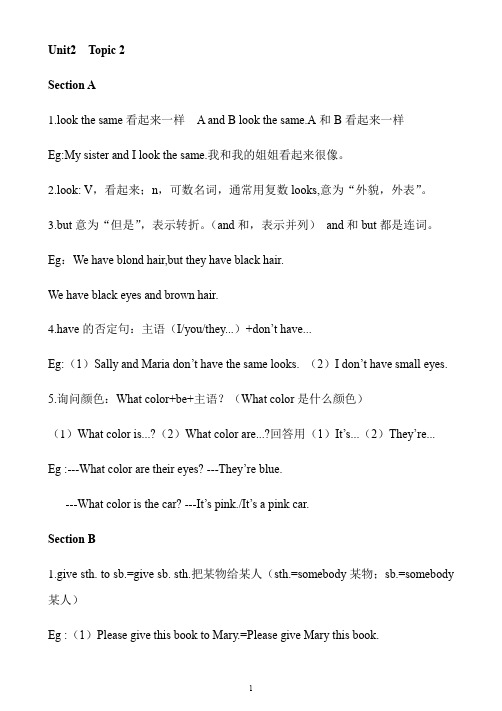
Unit2 Topic 2Section A1.look the same看起来一样 A and B look the same.A和B看起来一样Eg:My sister and I look the same.我和我的姐姐看起来很像。
2.look: V,看起来;n,可数名词,通常用复数looks,意为“外貌,外表”。
3.but意为“但是”,表示转折。
(and和,表示并列)and和but都是连词。
Eg:We have blond hair,but they have black hair.We have black eyes and brown hair.4.have的否定句:主语(I/you/they...)+don’t have...Eg:(1)Sally and Maria don’t have the same looks. (2)I don’t have small eyes.5.询问颜色:What color+be+主语?(What color是什么颜色)(1)What color is...?(2)What color are...?回答用(1)It’s...(2)They’re... Eg :---What color are their eyes? ---They’re blue.---What color is the car? ---It’s pink./It’s a pink car.Section B1.give sth. to sb.=give sb. sth.把某物给某人(sth.=somebody某物;sb.=somebody 某人)Eg :(1)Please give this book to Mary.=Please give Mary this book.(2)Give that eraser to me,please.=Give me that eraser,please.Notice:当sth.是it/them时,只能用give sth. to sb.Eg :Please give them to my teacher.2.Sorry/I’m sorry常用于下列场合:(1)自己做错了事,说错了话或不能满足对方的要求时,表示歉意(2)对别人的不幸遭遇或坏消息表示同情be sorry about对...感到抱歉复习:Excuse me ,是日常生活中人们询问情况,打扰别人、给别人造成不便时的客套话。
仁爱政治八年级上unit2topic2知识点归纳

仁爱政治八年级上unit2topic2知识点归纳仁爱政治八年级上 Unit 2 Topic 2 知识点归纳本文档将对仁爱政治八年级上 Unit 2 Topic 2 的知识点进行简要归纳。
1. 四个基本要素政治的四个基本要素是权力、国家、民族、政党。
权力、国家、民族、政党。
- 权力:指统治集团对社会进行管理和控制的能力。
- 国家:是指一个独立政治实体,有自己的领土、人民和主权。
- 民族:是指相同血缘、文化和历史背景的人们的共同体。
- 政党:是指在政治竞争中代表不同利益群体的组织。
2. 国家的特征和职能国家是一个独立的政治实体,具有以下几个特征和职能:- 领土:国家拥有一定的领土范围,是国家主权的一部分。
领土:国家拥有一定的领土范围,是国家主权的一部分。
- 人民:国家有自己的国民,国民享有国家给予的权利和义务。
人民:国家有自己的国民,国民享有国家给予的权利和义务。
- 主权:国家拥有独立的外交权和决策权,不受其他国家的干涉。
主权:国家拥有独立的外交权和决策权,不受其他国家的干涉。
- 治理:国家负责对社会进行管理和控制,维护秩序、保障人民福祉。
治理:国家负责对社会进行管理和控制,维护秩序、保障人民福祉。
- 国防:国家负责维护国家的安全和领土完整。
国防:国家负责维护国家的安全和领土完整。
- 经济:国家负责管理和发展国民经济,保障人民的基本生活需要。
经济:国家负责管理和发展国民经济,保障人民的基本生活需要。
3. 民主与专制民主和专制是两种不同的政治制度:- 民主:民主制度强调人民的自由和平等,人民通过选举和投票来选择领导人和政策,参与政治决策。
民主:民主制度强调人民的自由和平等,人民通过选举和投票来选择领导人和政策,参与政治决策。
- 专制:专制制度下,领导人具有绝对的权力,人民的权利和自由受到限制,政治决策由少数统治者决定。
专制:专制制度下,领导人具有绝对的权力,人民的权利和自由受到限制,政治决策由少数统治者决定。
- 1、下载文档前请自行甄别文档内容的完整性,平台不提供额外的编辑、内容补充、找答案等附加服务。
- 2、"仅部分预览"的文档,不可在线预览部分如存在完整性等问题,可反馈申请退款(可完整预览的文档不适用该条件!)。
- 3、如文档侵犯您的权益,请联系客服反馈,我们会尽快为您处理(人工客服工作时间:9:00-18:30)。
Unit2 Topic2知识点讲解和练习
1.--What color is it/ 单数名词?(它/…是什么颜色)
--It’s +颜色词。
(它是….色的)
Eg: --What color is it/this/that book? --It’s red/blue/yellow
2.--What color are they/复数名词?(它们/….是什么颜色)
--They’re +颜色词。
(它们是…..色的。
)
Eg:1)—What color are they/ these/those apples?
--They’re green/brown.
3.1)look the same看起来一样2)look different看起来不同
3)look like 看起来像4)look at…看着。
5)look happy看起来高兴Eg: We don’t look the same. =We look different.
Lucy and lily look the same. = Lucy looks like Lily.
4.英语中,长、短、大、小、颜色词修饰名词的顺序是:先长短大小,然后再颜色词+名词
Eg: big/small black eyes 大大/小小的黑色的眼睛
long/short brown hair 长长短短的棕色头发
5.What does/do .sb. look like? 某人长什么样子/某人看起来像什么样子?(用来对人或事物的外貌提问)
Eg: --What does he look like?
--He is tall and he has short black hair.
6.give .sb. sth =give sth to .sb. Sb:某人
给某人某物把某物给某人sth:某物
Eg.: Tom gives Jim a toy.= Tom gives a toy to Jim.
注意:如果两个宾语(即sb和sth)都是代词时,只能用give sth to sb. Eg: Please give it to her.
7.I know her.我认识她.(变成否定句)I don’t know her.
8.want to do sth.想要做某事
eg:Jane wants to buy a pen.(变否定句)
Jane doesn’t want to buy a pen.
4) Tom wants to buy a coat.(变一般疑问句)
Does Tom want to buy a coat?(做肯定和否定回答)
Yes, he does./No, he doesn’t.
9.buy sb sth=buy sth for sb(给某人买某物)
Eg: I buy her a dress.= I buy a dress for her.
10.this/that/a pair of shoes/gloves/pants 这双鞋子/这副手套/这条裤子(做主语,谓语动词用单数)
three pairs of shoes/gloves/pants 三双鞋子/三副手套/三条裤子(做主语,谓语动词用复数)
注意:a pair of shoes/pants做主语时,谓语动词与pair 保持一致。
Eg: A pair of gloves is in my bag.
Ten pairs of pants are blue.
练习:
1.I know English.(变否定句) I___ ____English.
2.Jack knows Chinese.(变一般疑问句,并作否定回答)
___ Jack____ Chinese? ___,____ _____.
3.Please give Maria the letter.(变同义句)
Please____ the letter____ Maria.
4.请把它给她。
Please ___ ____ __ ____.
5.他长着长长的金黄色的头发。
He has____ ______ _____.
6.那个女孩长着大大的蓝眼睛。
That girl____ ______ _____eyes.
7.Tom is tall and he has red hair.(对划线部分提问)
_____ ______ Tom____ _____?
8.She has a small nose and big eyes.(对划线部分提问)
___ ____ she____ ____?
9.They are young and have long black hair.(对划线部分提问)
_____ _____they______ ______?
10.He wants to buy a car.(变一般疑问句,并作否定回答)
____ he_____ to buy a car? ____, _____ ______.
11.They want to give me an apple.(变否定句)
They____ ____ to give me an apple.
12.我想要去买一双鞋子。
I____ ___ buy___ _____ _____shoes.
13.I buy my mom a coat.= I____ a coat_____my mom.。
